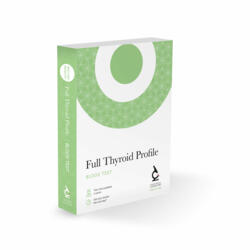
Fully analyse the function of your thyroid gland including checking for the commonest causes of thyroid dysfunction.
Thyroid problems are common and can cause significant health problems. A blood test is the only way to find out.
This test includes TSH, FT3, FT4 and Thyroglobulin and Thyroid Peroxidase antibodies.
Due to the comprehensive scale of this profile a phlebotomy sample is needed.